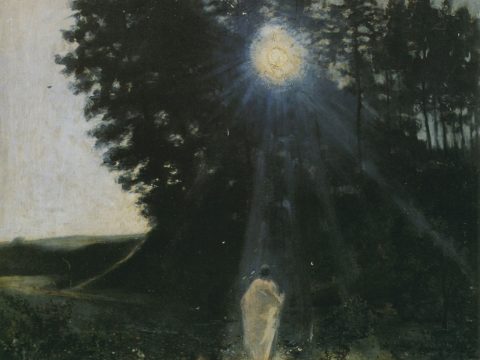
See this in Abraham. He had this promise that he would have a son in his old age; and Rom 4.19-21, Not being weak in faith, he did not regard his old age or deadness, nor the barrenness of Sarah’s womb, but believed in Him who had promised it. There he rests, and there he stays; he saw his body was dead, yet there was a living promise; and what if Sarah’s womb was barren, yet the promise was fruitful. He knew his own deadness and her barrenness; but he didn’t stay there long. As Abraham saw his body, therefore, so we may see our sins, and consider our many weaknesses. But must not so settle upon them, or consider them so as to be hindered by them from coming to God for mercy, which he freely offers us, and which we stand in need of. For while the soul of a man is daily plodding upon his own misery and distempered life, these two things follow:
- We stop the stream of God’s promise, and let down the sluice against it, so that the promise cannot enter into us.
- We set open the stream and floodgate of corruption, and make it run most violently down, and to flood in upon us; and in the end to overwhelm us.
Now the inconvenience arising by this is enough to flay the best Christian in the world; for what can a man get out of his corruption? He can have no more from it than is to be had; and it is in vain to look for comfort where it is not to be had. All this, and the least of all this, may dishearten us, but it will not encourage us, or put heart into us. See the humility and wisdom of the woman of Canaan, Mat 15.22-27. She follows Christ, but he doesn’t listen to her; he gives her a sore foil, and calls her a dog; and says, “you Gentiles are dogs; and the gospel of grace and salvation is the children’s bread.” Now, if she had only considered the words of Christ, and only looked into herself and her own baseness, then she would never have received either mercy or comfort from Him. But she says, “In truth Lord, I am a dog; yet even the dogs eat the crumbs that fall from their master’s table.” This was her resolution. There are two things in this, which express and set forth the frame of a gracious heart — a heart that is truly wise to attend to its own baseness, with faith — and that is her humility and wisdom. It is as if she said, “You say I am a Gentile and a dog; I confess it;” there’s her humility. “Yet, though I am a dog, I will not go outdoors, but lie under the table for mercy;” there is her wisdom. Thus she did; and so must we. And when our corruptions, as I said, flood in upon us, and we see ourselves quite lost and damned in our sins, we must then say, “In truth Lord, I am as bad as your word can make me; yet do not let me fly from mercy, but lie at the feet of my Savior’s mercy, till he looks upon me as he once did upon Peter, Luke 22.61.
It is fitting, and we ought to see our sins: but we must not stay too long there. See them we must, but not fasten on them, so as to shackle us from coming to Christ. I have said it, and will say it, that the sight of sin which does not drive a man to Christ for mercy, is ever sinful. Labor therefore to see your sins, and in this way:
First, see your sins in the Royal Law (Jas 2.8), as in the right mirror; a mirror that will present them as they are, and look not away till you have seen them so.
Secondly, so see them, by such a holy gaze at them, that you may see the utter insufficiency in yourself to satisfy (atone) for them.
Thirdly, and so see them, that by that sight, you may behold an absolute necessity of Christ to succor you. And then go speedily to Him who alone can help you; and dwell no longer on your sins, but go to the throne of grace, where there is plentiful redemption, from which issue pardons in abundance to remove that guilt which sin has brought upon your soul; and where there is power enough to enable you to be more than a conqueror over your corruption.
Thomas Hooker. THE POOR DOUBTING CHRISTIAN DRAWN TO CHRIST.



